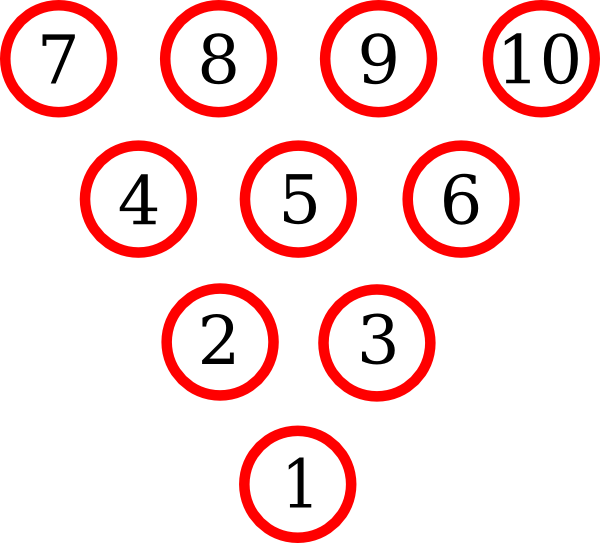Decoding the Bowling Pin Triangle: Number Order Secrets
Ever wondered why those bowling pins are arranged in that specific triangular formation? Or perhaps you've heard bowlers calling out numbers and wondered what they signified. The secret lies in understanding the bowling pin number order, a fundamental aspect of the game that can unlock a new level of strategy and precision in your bowling approach.
The bowling pin number order isn’t random. It’s a carefully designed system that provides a framework for targeting specific pins, understanding pin action, and ultimately, improving your scoring. Whether you're a seasoned bowler looking to refine your technique or a beginner just starting out, mastering the pin numbering system is essential for taking your game to the next level.
Understanding the pin layout and numbering system can seem intimidating at first, but it's simpler than you think. This system provides each pin with a unique identifier, making it easier to communicate about specific pins and strategize for spares. Imagine trying to explain to a teammate which pin you missed without a numbering system – it would be a chaotic mess! This numerical designation simplifies communication and allows for more precise targeting.
While the origins of the specific pin numbering sequence remain somewhat obscure, the importance of a standardized system became apparent with the rise of organized bowling. As the sport gained popularity, a universal language was needed to discuss strategies, analyze pin action, and teach techniques effectively. The numbering arrangement we use today provides that crucial common ground for bowlers worldwide.
One of the primary issues related to bowling pin setup is ensuring accuracy. Even slight variations in pin placement can dramatically impact ball trajectory and pin action. This is why bowling alleys use specialized equipment to ensure consistent pin placement according to regulations. Understanding the pin layout and numbering also helps bowlers identify potential setup issues that might affect their game.
Each pin in the ten-pin bowling setup is assigned a number from 1 to 10. The front pin, also known as the head pin, is number 1. The pins are arranged in a triangular formation with four rows. The second row has two pins (2 and 3), the third row has three pins (4, 5, and 6), and the back row, also known as the back four, consists of pins 7, 8, 9, and 10. This arrangement creates a consistent target for bowlers and allows for predictable pin action when struck by the ball.
Understanding pin numbering offers several advantages:
1. Improved Spare Shooting: Knowing the pin numbers allows you to accurately target specific pins when attempting spares, leading to higher scores.
2. Enhanced Communication: Using pin numbers makes it easier to communicate with teammates and coaches about specific pin action and strategies.
3. Better Understanding of Pin Action: The numbering system aids in visualizing how different ball angles and entry points affect pin movement, allowing for more strategic shot planning.
To understand the bowling pin setup, visualize the triangle. The front pin is 1. Directly behind and to the left of 1 is pin 2, and to the right is pin 3. Behind 2 is 4, behind 2 and 3 is 5, and behind 3 is 6. The back row consists of 7 (behind 4), 8 (behind 4 and 5), 9 (behind 5 and 6), and 10 (behind 6).
An action plan for mastering pin numbering involves: 1. Visualize the triangle. 2. Practice identifying pins by number. 3. Use the numbers when discussing spares. Successful bowlers often visualize their target pin by number before each shot.
Advantages and Disadvantages of Understanding Pin Numbering
| Advantages | Disadvantages |
|---|---|
| Improved spare shooting | Can initially seem complex for beginners |
| Enhanced communication | - |
| Better understanding of pin action | - |
Best Practices: 1. Visualize. 2. Practice calling out spares by number. 3. Use online resources. 4. Study professional bowlers' techniques. 5. Discuss strategies with experienced bowlers.
Real Examples: A 7-10 split is a common spare. A "Brooklyn strike" hits the opposite side of the head pin than intended.
Challenges: Remembering the numbers initially. Solution: Use visual aids.
FAQ: What is the head pin? (The front pin, number 1). What is a sleeper? (A hidden pin).
Tips: Use mnemonics to memorize the numbers. Focus on visualizing the pin layout.
In conclusion, the bowling pin number order is far more than just a numbering system. It's the key to unlocking a deeper understanding of bowling strategy, pin action, and spare shooting. From beginners learning the basics to seasoned pros refining their techniques, understanding the pin layout and its numbering system is essential for improving one’s game. By mastering this seemingly simple concept, bowlers can elevate their precision, enhance their communication, and ultimately, achieve higher scores. This knowledge transforms a seemingly random arrangement of pins into a strategic battlefield, where each number represents an opportunity for a successful shot. So, the next time you step up to the lane, remember the power of the pin number order – it might just be the secret to your next strike.
Decoding the u1002 code in your nissan rogue
Mastering trailer axle bearing torque your guide to a smooth ride
Navigating medicare a amp b drug benefits














